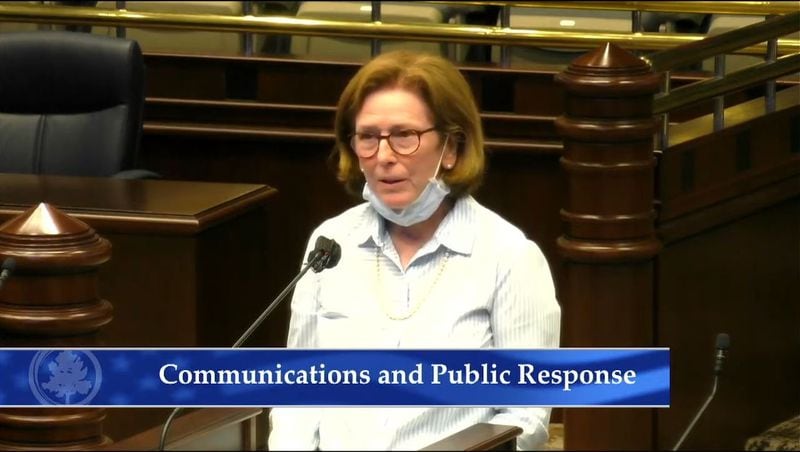‘More normal pace’ is expected, but for now, revenue reports remain strong
Georgia’s fiscal economist told legislators this past week that he expects state revenue collections to “slow down to a more normal pace” at some point this year.
It hasn’t happened so far.
State tax collections were up 24.3% in December, and they have increased 18.1% over the first six months of fiscal 2022.
That means that following a fiscal year that ended in July with a $3.7 billion surplus, the state is now up $2.28 billion in just half a year.
Those numbers are good news for Gov. Brian Kemp as he tries to get his record $30.2 billion budget proposal through the General Assembly. Kemp’s spending plan includes pay raises and bonuses for teachers, school staff and state employees; a refund for income tax payers; $600 million for new prisons; and hundreds of millions more for health care and mental health programs.
The sunny revenue numbers will also show up in the asset column for Kemp’s reelection efforts.
“We’ve got a lot of good things to talk about this year,” Kemp said at a joint meeting of the Georgia House and Senate Appropriations committees. “I have never been more optimistic about our state.”
He probably won’t, but Kemp could thank the federal government for the big boost it gave to the state’s economy in the form of direct payments to Georgians through the coronavirus stimulus, child tax credits and the Paycheck Protection Program.
University of Georgia professor Jeffrey Dorfman, the state’s fiscal economist, told lawmakers that massive federal spending helped Georgians save an extra $75 billion since the start of the coronavirus pandemic.
“This was the first time in American history we had a recession when credit card debt went down and credit scores went up,” Dorfman said, adding that the federal spending provided particular help to lower-income families.
Now that most Georgians are no longer receiving the direct federal payments, Dorfman said growth could slow in the coming year. Still, he said “the odds of a recession in 2022 are very low.”
Kemp, Perdue campaigns hit each other with briefs
The contest for the Republican nomination for governor is obviously generating a lot of interest.
It’s also generating a lot of paperwork.
Mostly legal briefs.
Former U.S. Sen. David Perdue, who is running against Gov. Brian Kemp, has filed a lawsuit challenging a state law that allows the governor and select legislative leaders to raise unlimited contributions through “leadership committees,” even while the General Assembly is in session.
Meanwhile, Kemp has filed an ethics complaint against Perdue, alleging that he is receiving illegal help from a new fundraising committee.
State law currently prevents the campaigns of state officials such as Kemp and lawmakers from raising money while the General Assembly meets in session, which this year won’t end until about two months before the May primaries.
But another law — the one at the root of Perdue’s suit — permits the governor and select legislative leaders to form leadership committees to collect campaign contributions even during legislative sessions and without any limits on how much donors can give.
So, theoretically, a lobbyist seeking a tax break for a client could give $100,000 or more to a leadership committee while the legislation is still under consideration by lawmakers or even while the governor is determining whether to sign it into law or veto it.
Kemp signed into law the leadership committee legislation without any public notice and shortly afterward created the Georgians First Leadership Committee. It’s been raising big money from Capitol donors ever since.
Perdue would not be allowed to use such a committee unless he won the GOP primary. Neither would Stacey Abrams or any other Democratic candidate until that party’s primary is settled.
All statewide candidates, such as those running for governor, also face restrictions on how much they can raise from any individual. That’s currently set at $7,600 for the primary and again for the general election, plus $4,500 per runoff.
But those limits don’t apply to leadership committees.
The committees also offer one other advantage: They can coordinate their efforts with a candidate’s campaign, something regular political action committees and other funds are not permitted to do.
That’s where Kemp’s complaint comes in.
His campaign alleges that a group called the Georgia Values Fund is coordinating with Perdue’s campaign. Kemp officials say the fund’s website is asking donors to provide cellphone numbers to get Perdue campaign alerts, updates and news, and it instructs donors to mail contributions to Perdue’s campaign, giving them a mailing address for where to send checks.
Perdue proposes police unit to target election fraud
Former U.S. Sen. David Perdue, who is now challenging Gov. Brian Kemp in the GOP primary, is calling for a new police force to investigate election fraud.
Perdue entered the race at the urging of Donald Trump and has made the former president’s false claims of voter fraud during the 2020 election a central theme of his campaign.
The former senator opened his campaign by criticizing Kemp for failing to call a special session to overhaul election laws, saying he wouldn’t have certified the state election if he had been governor. Days after launching his bid, Perdue filed a lawsuit that mirrored debunked claims about the election from a conspiracy theorist.
His proposal for the new police unit comes on the heels of Republican Florida Gov. Ron DeSantis’ announcement that he plans to establish a first-of-its-kind election police force that has drawn heavy criticism from voting rights advocates.
Georgia already has election investigators who pursued hundreds of allegations about the 2020 election, debunking almost all of them. Their findings refuted claims of counterfeit ballots, ballot stuffing, dead voters and mismatched signatures on absentee ballot envelopes.
State election officials have also said there’s no indication of fraud after three ballot counts, and numerous lawsuits seeking to overturn the election were either dismissed or withdrawn from courts.
Perdue also also said he’d require election results to be “independently audited” before they’re certified, taking a swipe at Kemp for not delaying the process. The governor was bound by law to certify the 2020 election, which ended with a slim victory for Democrat Joe Biden over Trump.
“He failed us,” Perdue said of Kemp, “and Georgians lost confidence that their vote would count.”
Kemp spokesman Cody Hall said the proposal amounted to an admission from Perdue that “his entire campaign is a lie.”
“His proposal recognizes that governors have no legal authority in the oversight, administration or investigation of elections under current state law and constitution,” he said.
Credit: Fulton Government Television
Credit: Fulton Government Television
Fulton critic joins state board that will determine fate of county election board
The Georgia Republican Party picked a critic of Fulton County’s elections to fill a spot on the State Election Board, just as it’s conducting a review that could lead to the removal of the county’s elections board.
Janice Johnston has spoken about Fulton’s problems during county election board meetings since the 2020 election. She has called for the firing of the county’s elections director, criticized the job performance of temporary election workers and repeated unsubstantiated allegations of “falsified tally sheets” during an audit.
State law requires Gov. Brian Kemp to immediately appoint political party nominees to the State Election Board. Johnston will replace Ahn Le, whose two-year term expired at the end of last year.
The State Election Board last year ordered that Fulton undergo a performance review that is currently underway. After the review, Johnston and the other members of the state board could vote to replace the county’s election board with an appointed administrator under Senate Bill 202, the election law Republicans pushed through the General Assembly last year.
Johnston joins two other Republicans on the five-member State Election Board: Ed Lindsey, who was nominated this month by House Speaker David Ralston, and Matt Mashburn, whom the state Senate confirmed last year. The Democratic Party of Georgia nominated Sara Tindall Ghazal to the board last year.
The fifth seat is vacant because SB 202 removed Secretary of State Brad Raffensperger from the board last year. The majority-Republican General Assembly has the authority to name someone to fill that seat during this year’s legislative session.
Turnover of guards remains high even after raises
Georgia’s Department of Corrections and Department of Juvenile Justice are still having trouble holding onto their guards even after they received 10% raises last year.
Commissioners for the two departments cite low pay as a main reason for their retention problems, although not the only one.
With last year’s bump in pay, entry-level corrections officers at adult and juvenile detention centers earned about $31,000.
Corrections Commissioner Timothy Ward told a joint committee of the Legislature’s budget writers this past week that annual turnover for corrections officers is about 49%.
At the Department of Juvenile Justice, entry-level officers left within the first year on the job at a rate of 90% in fiscal 2021, which ended June 30.
That was an improvement. The rate was 97% the previous year.
“(First-year turnover is) still high, but we’re trending in the right direction,” Juvenile Justice Commissioner Tyrone Oliver told legislators.
Overall turnover at the agency fell from 45% in fiscal 2020 to 40% in fiscal 2021.
High turnover can be a severe problem because training officers can cost agencies millions of dollars a year.
Oliver said Gov. Brian Kemp’s proposal to boost state workers’ pay by $5,000 could help, but both commissioners said the working environment is difficult and causes many to leave.
“We typically lose officers before they get through the academy,” Oliver said. “Most people leave within 30 days. Some people walk in and realize this is not for them — it’s a difficult population, they can’t bring in their phones, they can feel cut off from the outside world. It’s almost like a culture shock.”
Libertarians set their ticket for statewide offices
The Libertarian Party of Georgia has rolled out a full slate of candidates for statewide races in November’s election.
Shane Hazel is at the top of the Libertarian ticket, running for governor. Hazel ran for the U.S. Senate in 2020, gaining 2.23% of the vote, enough to force a runoff that Democrat Jon Ossoff won by defeating the Republican incumbent, David Perdue.
Former state Rep. Ken Pullin, a onetime Republican, is the Libertarian candidate for state school superintendent.
Also running are Chase Oliver for the U.S. Senate, state party Chairman Ryan Graham for lieutenant governor, Ted Metz for secretary of state, Martin Cowen for attorney general, John Counts for agriculture commissioner, Danny Dolan for insurance commissioner, Christine Austin for labor commissioner and Colin McKinney for public service commissioner for District 2.
Candidates, endorsements, etc.:
— Bryan Miller, a Democrat and the grandson of former Gov. Zell Miller, ended his campaign for lieutenant governor. Miller left the race shortly after Charlie Bailey entered the Democratic primary for lieutenant governor after halting his bid for attorney general.
Also running in the Democratic primary for the state’s No. 2 job are state Rep. Erick Allen of Smyrna; state Rep. Derrick Jackson of Tyrone; and state Rep. Renitta Shannon of Decatur.
Lt. Gov. Geoff Duncan, a Republican, chose not to seek reelection, setting off a contest on the GOP side with three candidates: state Sen. Burt Jones, state Sen. Butch Miller and party activist Jeanne Seaver.
Jones has reported raising $3.75 million, with $3.4 million in cash on hand. That includes $2 million that Jones, an executive in a family-owned petroleum firm, loaned to the campaign.
— Democrat Everton Blair, the chairman of the Gwinnett County Board of Education, has entered the race for state school superintendent. Also running in the Democratic primary is Dr. Jaha Howard, a dentist and member of the Cobb County Board of Education.
Republican incumbent Richard Woods faces a challenge in the GOP primary from John Barge, a former state school superintendent.
— Democrat Stacey Abrams picked up the endorsement of the Georgia chapter of the AFL-CIO in her bid for governor.
— The Congressional Black Caucus is supporting U.S. Rep. Lucy McBath in her primary fight with U.S. Rep. Carolyn Bourdeaux in the 7th Congressional District.
— Patrick Witt, a Republican candidate in Georgia’s 10th Congressional District, has been endorsed by members of former President Donald Trump’s post-election legal team. Witt has the backing of Cleta Mitchell, one of the attorneys who was on the call Trump made to Secretary of State Brad Raffensperger pressuring him to “find” the votes necessary to reverse his 2020 reelection loss in Georgia. Witt’s candidacy is also supported by Ray Smith, a lawyer who worked on Lin Wood’s failed attempt to overturn the state’s election results.
— Mike Collins, who is also running as a Republican in the 10th Congressional District, has roughly $750,000 in cash on hand, including a $400,000 loan he made to his campaign. Collins took in about $150,000 during the most recent fundraising quarter.
— Former state Sen. Vincent Fort has launched a challenge against U.S. Rep. David Scott for the Democratic nomination in the 13th Congressional District.
About the Author












